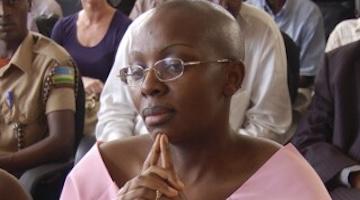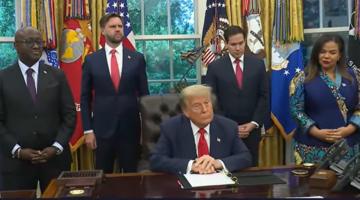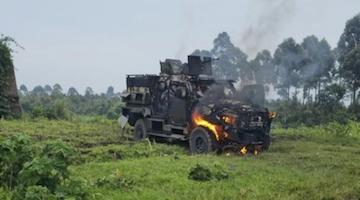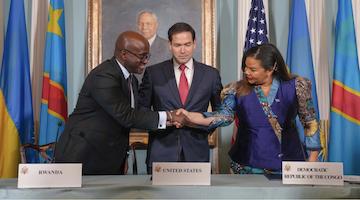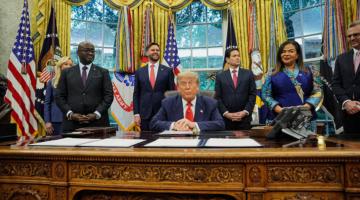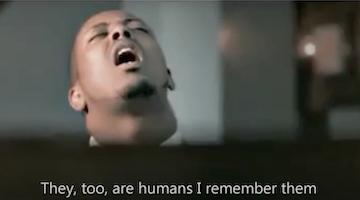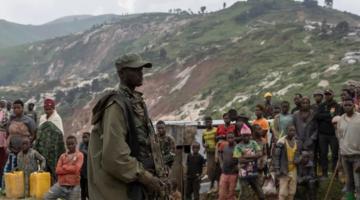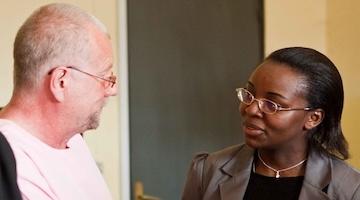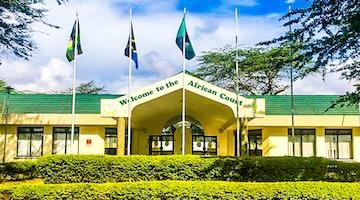The Victoire Ingabere Umuhoza Prize for Democracy and Peace is awarded to people who work for democracy, peace, and freedom in the Great Lakes Region of Africa.
The stories of Rwanda and Democratic Republic of the Congo (DRC) have been tragically intertwined since the US backed the 1990 invasion of Rwanda by the Rwandan Patriotic Army, the military wing of the Rwandan Patriotic Front. The RPF fought the Rwandan government for four years until it seized power in 1994 and established the totalitarian state headed by President Paul Kagame, who remains in power today.
The Rwandan Patriotic Army then invaded DRC, once again with US backing, in 1996 and remained to occupy and plunder its resources. The occupation and plunder continue so long as DRC’s vast resources, oil, timber, but most of all minerals, are funneled out to the industrialized world.
Rwandan activist, politician, and political prisoner Victoire Ingabire Umuhoza advocates for those suffering on both sides of the Rwandan/Congolese border, and the winners of this year’s Victoire Ingabire Umuhoza Democracy and Peace Prize are both Rwandan and Congolese. One is the late Rwandan journalist John Williams Ntwali; the other is Congolese American scholar and activist Kambale Musavuli.
John Williams Ntwali
Rwandan journalist John Williams Ntwali died in a suspicious collision between a car and a motorcycle in Rwanda’s capital, Kigali, in January, two months before receiving the prize. President Kagame’s newspaper, The New Times, a de facto organ of the Rwandan government, reported that authorities told them the accident had happened on January 18, at 2:50 a.m. in Kicukiro District in Kigali, the capital of Rwanda. Ntwali was the passenger on a motorcycle, and the driver of the car was reportedly arrested. Ninety human rights groups have called for an investigation into his death that is independent of the Rwandan government.
Ntwali had been jailed repeatedly and his life had been threatened for reporting on struggles against land evictions and high profile, politicized trials of journalists, commentators and opposition members. He had posted videos about prison conditions on his YouTube Channel.
In June 2022, he told Human Rights Watch:
“I’m told that after CHOGM [the Commonwealth Heads of Government Meeting], they won’t play around with us anymore. I’ve been told five or six times. I receive phone calls from private numbers. Some [intelligence] people have come to my house twice to tell me. NISS [National Intelligence and Security Services] has told me: ‘If you don’t change your tone, after CHOGM, you’ll see what happens to you.’”
Ntwali joins a list of Rwandan journalists to have died violently and suspiciously after criticizing the Rwandan government, leaving little doubt about who killed them.
Press repression has been widely and repeatedly reported by The Guardian, Reuters, Reporters without Borders, Human Rights Watch, Amnesty International and more. It is the subject of Bad News, Last Journalists in a Dictatorship, a harrowing book by Anjan Sundaram, who spent years trying to teach journalism in Rwanda.
In his review of Sundaram’s book, Guardian staffer Ian Birrell writes:
“The doomed futility of his work is seen when his class discusses an article about Victoire Ingabire, the opposition politician who returned from Holland to run against Kagame in 2010, only to be accused of ‘genocidal ideology’ and thrown in jail. Newspapers called her a criminal before her trial, while reporters smeared her with false sex claims. ‘How do you expect otherwise?’ asks one journalist. ‘If we don’t call her a criminal the authorities think we are on her side. They have even threatened my children. But if we say she is guilty they leave us alone. So we call her a villain, genocidal.’”
John Williams Ntwali was a journalist who refused to play by that rule or any others laid down by Rwanda’s totalitarian regime. He is a model for fearless journalism, and his struggles on behalf of Rwandan people will not be forgotten.
Kambale Musavuli
Kambale Musavuli has been a frequent contributor to Black Agenda Report, writing on AFRICOM in the Congo and Hijacking the Congolese People’s Victory, an analysis of the 2018 election that put current Congolese President Félix Tshisikedi in power. He has also been a guest on Black Agenda Radio; he spoke to the late Glen Ford in Precious Minerals + Rogue President = Mass Death in Congo.
As a researcher, analyst, student coordinator, advocate, and spokesperson, first with Friends of the Congo and now with the Center for Research on Congo-Kinshasa, he has helped spread awareness of the horrific violence and theft that has fueled every industrial revolution in the West, including the current shift to renewable energy technologies.
In one of our first conversations for Pacifica Radio, Kambale and I discussed the 1982 Congressional Budget Office Document “Cobalt: Policy Options for a Strategic Mineral,” which laid out the US foreign policy imperative of controlling the cobalt reserves of southeastern Congo and northeastern Zambia. At the time, jet engine technology had advanced to the point where cobalt was absolutely essential to their manufacture.
In addition to research, writing, and advocacy, Kambale works with organizations like the Congo Leadership Initiative to empower young Congolese leaders to overcome the centuries of exploitation that began with the transatlantic slave trade and finally realize the enormous untapped potential of Congo and the Congolese people.
Having been awarded the Victoire Ingabire Umuhoza Democracy and Peace Prize myself in 2014, I was glad to welcome Kambale into the growing community of honorees and members of the Women’s International Network for Democracy and Peace who created the prize. We are a family and a growing network committed to peace and justice in Rwanda, DRC, Africa and beyond.
I’m only sad that John Williams Ntwali will not be able to join us going forward. May he rest in peace.
Ann Garrison is a Black Agenda Report Contributing Editor based in the San Francisco Bay Area. In 2014, she received the Victoire Ingabire Umuhoza Democracy and Peace Prize for her reporting on conflict in the African Great Lakes region. She can be reached at ann(at)anngarrison.com.

